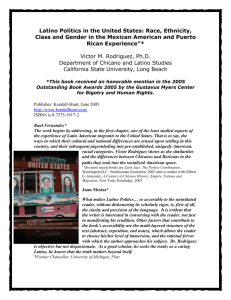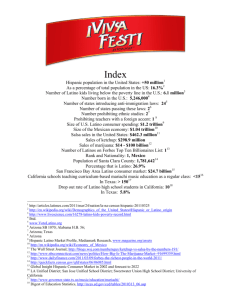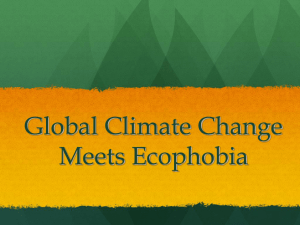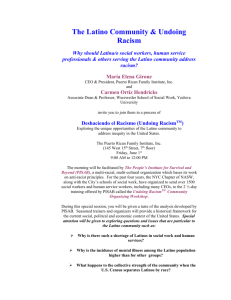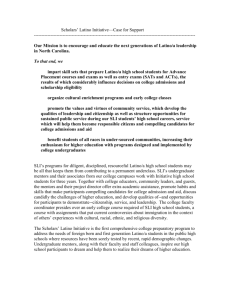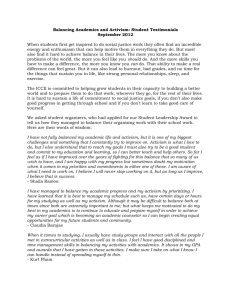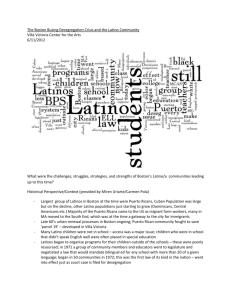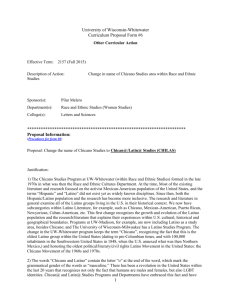Latino Activism - University of Wisconsin–Milwaukee
advertisement
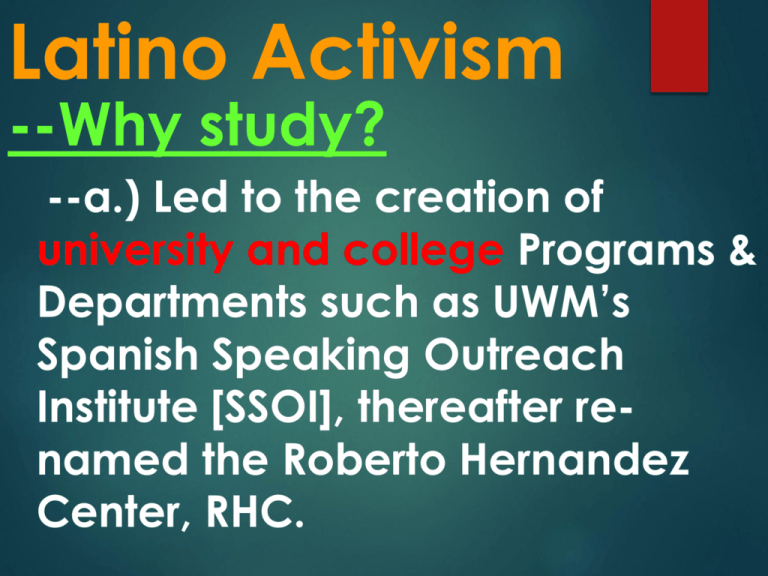
Latino Activism --Why study? --a.) Led to the creation of university and college Programs & Departments such as UWM’s Spanish Speaking Outreach Institute [SSOI], thereafter renamed the Roberto Hernandez Center, RHC. Latino Activism --Why study? --b.) Led to a generation of university & college scholars that embarked on a variety of academic & research pursuits that currently form the basis for much of what we learn and teach. Latino Activism --Why study? --c.) Chicano Studies and thereafter, Latino Studies, are rooted on the community activism that led to their creation—therefore community engagement and/or empowerment is central to our understanding this discipline. Latino Activism --Goals: --a.) Essentially, to assure the incorporation of the history, contributions, and aspirations of a group of Americans that heretofore have not been part of the `American Experience’--what did the “American Dream” mean to them/us?. Latino Activism --Goals: --b.) To contribute to the empowerment of our community: principally through educational attainment, political involvement, economic development/opportunity, artistic expression, and overall community wellbeing. Latino Activism --Goals: --c.) To engage with the broader community in a manner that allowed/s for mutual respect, appreciation, understanding, and eventual acceptance, but done under terms that do/did NOT subjugate either one from full expression and fulfillment. Latino Activism --Today’s Issues: a.) Immigration Reform --Comprehensive Reform --DREAM Act --DACA/DAPA --Central Amer. Children/Women --Deportations Latino Activism --Today’s Issues: b.) Education --Quality of public K-12, dropouts --Alternative models --Cost of Higher Education/in-State Tuition --Scale/size of K-12 schools --Lack of Latino teachers/bilingual --Segregation Latino Activism --Today’s Issues: c.) Political Engagement --Electing Latino officials --Increasing power --Key electoral states --Becoming citizens --Voting, lack off --Intra-Latino unity, lack-off --Lack of national leadership Latino Activism --Today’s Issues: d.) Discrimination/Exclusion --Lack of presence in Pop culture --Language vs. skin color --Intra-Latino conflicts --Not Black/White paradigm --Threat to Affirmative Action --Largest minority—implications? --skin color vs. accent vs. foreign-born Latino Activism The nation’s immigration debate and the treatment of immigrants is, in many ways, our country’s new civil rights debate. This is particularly true for our nation’s Latinos that are NOT undocumented, for negative perceptions/treatment of undocumented individuals percolates onto ALL Latinos. Latino Activism There is a re-emergence of Chicanismo in US, for the social conditions that existed in the 60s/70s, are again prevalent. More students are choosing Chicano Studies majors and there are more colleges/universities offering Chicano Studies programs. Latino Activism Today’s activism cannot compare to the activism of the 60s/70s, for social status of Latinos is in many ways different today…the role of social media can and is very important for `community organizing’…still, the central `spark’ for activism is that individuals have to have/feel passionate about something in the lives—to make our life experience better, which makes our country better. REVIEW QUESTIONS 1.) Who was Tiburcio Vasquez? 2.) When and why was Chapman Hall taken over? 3.) Why study Latino activism? 4.) Where/in what is Chicano/Latino Studies is rooted? 5.) What was one of the principal goals of Latino activism? 6.) What are the four major proposed provisions of comprehensive immigration reform? 7.) What is an example of an alternative model for education? 8.) What is meant by “key electoral states”? 9.) What’s a Chicano?...Chicanismo? 10.) Do the social dynamics that existed in 60s & 70s exist today?
